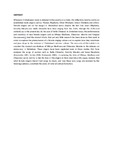Please use this identifier to cite or link to this item:
https://cris.library.msu.ac.zw//handle/11408/955Full metadata record
| DC Field | Value | Language |
|---|---|---|
| dc.contributor.author | Rwafa, Urther | - |
| dc.contributor.author | Vambe, Maurice | - |
| dc.date.accessioned | 2016-04-21T14:57:43Z | - |
| dc.date.available | 2016-04-21T14:57:43Z | - |
| dc.date.issued | 2007 | - |
| dc.identifier.issn | 1812-5980 | - |
| dc.identifier.uri | http://hdl.handle.net/11408/955 | - |
| dc.description | www.tandfonline.com/doi/abs/10.1080/18125980701754611 | en_US |
| dc.description.abstract | Whenever Zimbabwean music is debated in the country or outside, the reflections tend to centre on established male singers such as Thomas Mapfumo, Oliver Mtukudzi, Simon Chimbetu and others. Female singers are on the margin of theoretical works despite the fact that Susan Mapfumo, Dorothy Masuku and Stella Chiweshe have been singing from the 1950s, through the 1970s and certainly up to the present day (in the case of Stella Chiwese). In Zimbabwe today, the performances and creativity of new female singers such as Mbuya Madhuve, Chiwoniso Maraire and Fungisai Zvakavapano2 steal the musical charts. And yet very little research has been done on their work in order to explore the phenomenon of a female singing culture and to explain how they contribute and give shape to the contours of Zimbabwe's national culture. The main aim of this article is to consider the musical contributions of Mbuya Madhuve and Chiwoniso Maraire to the debates on democracy in Zimbabwe. These singers have been neglected even in those studies that have analysed the songs of women such as Stella Chiweshe, Dorothy Masuku and Susan Mapfumo (Kwaramba 1997, Vambe 2004, Makwenda 2005). In analysing the lyrics of Mbuya, Madhuve and Chiwoniso we do not try to link the lives of the singers to their creativity.3 We argue, instead, that what female singers intend their songs to mean, and how these very songs are received by the listening audience, constitute the arena of national culture formation. | en_US |
| dc.language.iso | en | en_US |
| dc.publisher | Taylor & Francis (Routledge) | en_US |
| dc.subject | Women musicians - Zimbabwe | en_US |
| dc.subject | Popular music - Zimbabwe | en_US |
| dc.title | ‘Hear our Voices’: Female popular musicians in post-independence Zimbabwe | en_US |
| dc.type | Article | en_US |
| item.fulltext | With Fulltext | - |
| item.openairetype | Article | - |
| item.languageiso639-1 | en | - |
| item.cerifentitytype | Publications | - |
| item.grantfulltext | open | - |
| item.openairecristype | http://purl.org/coar/resource_type/c_18cf | - |
| Appears in Collections: | Research Papers | |
Files in This Item:
| File | Description | Size | Format | |
|---|---|---|---|---|
| hear our voices.pdf | 203.1 kB | Adobe PDF |  View/Open |
Page view(s)
78
checked on Jul 26, 2024
Download(s)
8
checked on Jul 26, 2024
Google ScholarTM
Check
Items in MSUIR are protected by copyright, with all rights reserved, unless otherwise indicated.


